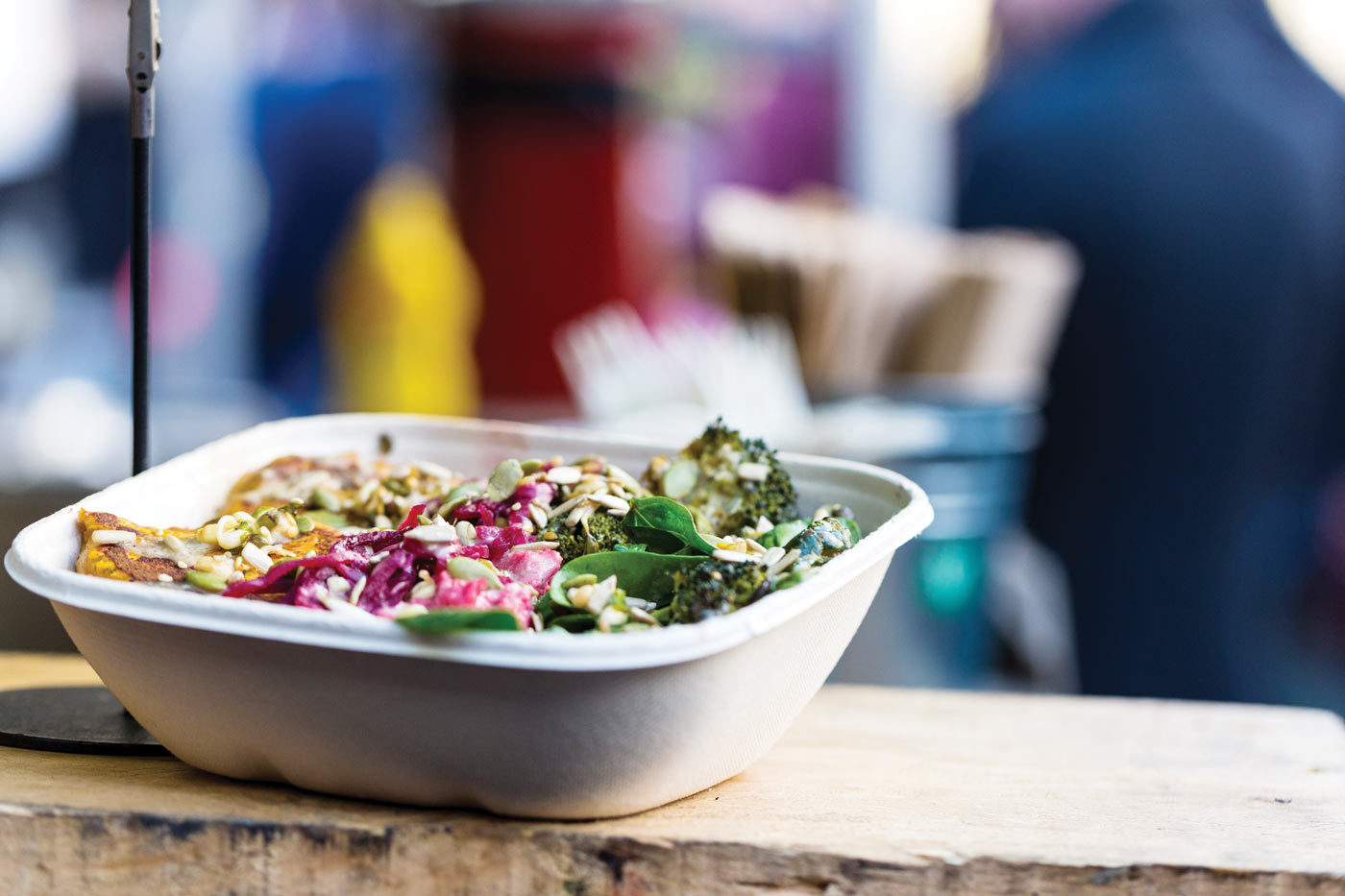
Scratching your head over what you can do about plastic-packed oceans? Not sure how to eat, shop and cook in a way that won’t damage the environment? Want to support your local producers but stuck in a supermarket rut?
Trying to be a sustainable and ethical foodie is flippin’ complex. But while some claim there’s not much we can do as individuals, we think that making small positive changes is better than burning through the planet’s finite resources and leaving a mess for the next generation to clean up. Here are a few ideas to try …
Food waste warriors
1. Head, shoulders, nose-to-tail
Taking a nose-to-tail approach to cooking not only reduces food waste, it also saves cash. Buy a whole chicken instead of pricey fillets, ask your butcher about cheaper – and often tastier – cuts and use leftover bones to make stock in the slow cooker.
2. Eat the seasons
There’s a reason why strawberries taste better in summer and squash make seriously good soup in autumn. Eating in tune with the British seasons supports local farmers, reduces fruit ‘n’ veg airmiles and is hands-down more delicious. Find out what’s in season here.
3. Be fussy with fish
While some of the nation’s fishy faves are not sustainable, there are plenty of tasty alternatives (plump for seabass, haddock, plaice or trout) for your ocean-friendly Friday night supper (www.msc.org).
4. Become BFFL with your freezer
The freezer is a haven for storing bread, milk and chopped toms that are teetering on the edge of seeing better days. Also try batch cooking sauces and freezing to save time, money, energy and waste. Just remember to keep your drawers organised and to label up – we’ve all had a defrosted curry/cooked tagliatelle debacle.
5. Doggy bag it
There’s no shame in asking to take your leftovers home when eating out. Even better, take along your own tub.
6. This little foodie went to market
Make the most of your local farmers’ market and community shops. It’s been proven that buying little and often, instead of a weekly shop at the supermarket, reduces the amount of food ending up in the bin.
7. Best-before bother
While use-by dates are a moot point, it’s widely agreed that best-before dates on food items can be taken with a pinch of salt. Use your senses (smell and colour are obvious indicators) to judge whether that bread’s destined for the toaster or the bird table.
8. Prep like a pro
It may seem like homework on the weekend but planning meals for the week ahead can save some serious dough and prevent waste.
9. Community spirit
The good folk of Frome led the way with community fridges – a waste-tackling initiative where locals leave unwanted-but-still-good food for neighbours to pick up for free. Not got a local free-for-all fridge? Set up your own with help from Hubbub.
10. Fridge raider
It may not look like a lot, but there’s probably a tasty meal lurking in your veg drawers. Give leeks, peppers, potatoes and the like a new lease of life in a lunchtime frittata, blitz limp kale with storecupboard grains to make a chunky soup and grate root veggies to create fragrant spiced patties.
11. Bread rebrand
Don’t even think about chucking stale rolls and loaves. A quick splash under the tap and a 10 minute blast in a hot oven will crust up those bad boys for soup dipping.
12. Appearances aren’t everything
Think of choosing veg like picking a long-term mate. Look past surface blemishes and less-than-perfect outlines and concentrate on what lies beneath. Fruit and veg doesn’t need to be buff to be beautiful.
13. Fridge-phobic or fridge-friendly?
The life of bananas, celery, herbs, berries and even root veg can be prolonged in the fridge but the likes of aubergines, courgettes, tomatoes and squash are better kept somewhere dry and cool.
14. That’s crackers
Savoury biscuits are best stored in airtight tins but if they’re less than crisp they can be revived with a gentle five minute bake at around 180°c.
15. Turn stale loaves into bread and butter pudding
Sweet or savoury, it’s all good.
Lifestyle hacks
16. Move to Totnes
Okay, moving may be a bit of a leap, but communities across the South West can learn from Transition Towns such as Totnes. Set up ‘to strengthen the local economy, reduce environmental impact and build resilience for a future with less cheap energy’, the volunteer-led organisation runs initiatives including health and wellbeing projects, local food hubs and green transport schemes. It’s also got some fab restaurants such as The Curator Kitchen.
17. Which bin is best?
Your scraps aren’t destined for landfill. If your local council doesn’t provide food bins, buy a small composter and transform unwanted leftovers into nutrient-rich grub for the garden.
18. Give back via foodbanks
There are over 400 foodbanks across the UK which provide people in need with emergency food supplies. Pop a couple of packs of non-perishable goods into the donation box next time you’re at a supermarket or church – or go the extra mile and volunteer at your nearest foodbank.
19. Beer by bike
Bristol foodies are leading the way when it comes to cutting CO2 and doing deliveries via velo. Bicycle courier company Velocious delivers anything from artisan gin and craft beer to Bristol-made brie and locally grown broccoli around the city.
20. Get a lunchbox
Five minutes of effort after work is going to save time, money and unnecessary food packing on tomorrow’s lunch. Bonus smug points when you’re tucking into last night’s delicious leftovers while the rest of the office are eating soggy sarnies out of a disposable box.
21. Take it slow
The slow cooker is a green foodie’s best friend. Said to use the same amount of energy as an eco lightbulb, making dinner in the slow cooker will not only sweeten your ‘leccy bill, it’ll also turn cheap cuts of meat into meltingly-soft masterpieces like pulled beef brisket and pork.
22. One foodie’s rubbish is another foodie’s treasure
Next time you’re chucking something in the bin, consider whether you – or one of your creative chums – can upcycle it. Turn lid-lacking Tupperware into seed planters, use egg cartons as mini cupcake giftboxes or refashion a rusting cake tin into a quirky bird bath.
23. Green-fingered foodie
No one likes buying herbs at the supermarket as they’re expensive, wrapped in a ridiculous amount of plastic and often go limp before you’ve had the chance to use them, so get a mini herb garden on the go. You don’t need much space – a small spot in the garden or a roomy windowsill will do the trick.
24. Wash your recyclables
A shocking amount of perfectly recyclable containers make their way into landfill each year because of food residue. Give ‘em a good wash before recycling – you can even chuck items such as plastic pots and glass jars in the dishwasher.
25. Go eco
Mainstream washing up liquids contain a whole host of elements which can take centuries to biodegrade. Eco brands such as Ecover use vegetable-based components which degrade much faster.
26. Pure produce
Heavily processed food items usually have more road miles behind them, going to different factories for different processes. Pick ‘real’ foods such as fresh veg from the farm shop and meat from the local butcher.
27. Quality coffee kicks
Ditch the daily trip to a coffee chain and find a local indie for your morning caffeine fix. Speciality cafes such as Bristol’s Small Street Espresso pay more for higher quality beans, which means more money in the pockets of coffee farmers in poorer parts of the world.
Livin’ la vida local
28. Get a local veg box
It’s another way for local producers to get their goods to you and keeps money and jobs in the rural economy.
29. Call the milkman
Get ready to hear the clink of bottles rattling down your street like in the good ol’ days, because glass bottled milk is making a comeback. Doorstep deliveries in the UK are now up to 1 million per day (up 200,000 in the last two years). Two South West companies to check out are Cotteswold Dairy and Pensworth.
30. Support your local specialists
Out-of-town shopping and supermarkets can eat the heart out of small towns. Even if you do your main shop at the supermarket, save some weekly spend for your local food shops (and other stores) to help them stay in business – so you’ll still have a local cheesemonger when you want something special for that dinner party.
Plastic (not so) fantastic
31. Start the day right
Say no to plastic-lined takeaway cups. Instead, invest in a KeepCup, Ecoffee bamboo cup or similar.
32. Get Tupperware-tastic
Your local deli, butcher and fishmonger are getting used to being asked to put food in the container you brought from home rather than using plastic bags. Supermarkets vary – some have rules, so check first.
33. Choose packaging-free
Some South West shops have cottoned on to the zero waste approach and are selling food via dispensers. Try regional pioneers Earth.Food.Love in Totnes and The Real Food Store in Exeter.
34. Check your plastic at the supermarket
Do you really need your pears in a plastic bag rather than loose in the trolley?
35. Supermarket sweep
If you can’t avoid buying bread and veggies in plastic packaging, be sure to recycle them at your local supermarket. The plastic bag recycling points also accept bread bags, bubble wrap, freezer bags and more.
36. Swap shop
There are many ingenious planet-loving replacements for necessary household items. Try beeswax wrap instead of clingfilm or tin foil, compostable coffee pods and bamboo toothbrushes.
37. Skip the straw on your next night out
Straw-less sipping is no biggie and if you can’t do without (lipstick – we get it) invest in your own stainless steel or a glass version to take in your bag – or choose drinks where no straw is required.
38. Pick up plastic on the beach
Whether you take part in organised beach cleans or take a few pieces home with you whenever you visit, if everyone did it there would be less plastic on our beaches for sealife to ingest. Check out #2minutebeachclean which was set up by Martin Dorey in Devon.
39. Buy a reusable water bottle
And lobby your local cafes, restaurants and bars to join the ReFill scheme, which provides free tap water when you drop by with your bottle.
40. Cut your can holders
The plastic rings that hold a six pack of tinnies can catch fish and suffocate them. Snip them in half before putting in the bin or, better still, choose drinks in packaging without them.
41. Take a reusable tote
It’s obvious – but still easy to forget – so stash them in the boot of the car, fold one up in your day bag, stick one in your desk drawer …
Sustainable pleasures
42. Rethink what you drink
Ask for tap water when eating out and avoid the hefty carbon footprint that comes with bottled.
43. Champion the staycation
Swap the Greek islands for the clear blue waves of Cornwall, the Dordogne for the pretty limestone cottages of the Cotswolds and northern Spain for a walking holiday in the rolling hills of Devon.
44. Don’t go green with envy
An ethical lifestyle isn’t necessarily about dreary do-nots, it can also be about feasting on the very best food in top fine dining restaurants. Leading chefs such as Nathan Outlaw tend to prioritise high-welfare farming, sustainable fishing, ethical sourcing and cooking with the seasons.
45. Support ethical eateries
Restaurants such as Jamie Oliver’s Fifteen Cornwall, which have a charitable aim to give back to the local community, trump the nationwide restaurant chains every time.
46. Support local indies
When you eat out at a local independent restaurant you are supporting local families instead of putting money into the hands of multinational corporations. Check out www.trenchermans-guide.com for a cracking list of excellent indies.
47. How green are your foodie faves?
Don’t be afraid to ask your favourite cafes, restaurants and dining pubs whether they’re recycling their bottles, plastics and kitchen waste. Owners value customers’ views and your comment could be the one that inspires change.
48. Pledge it
Look out for restaurants that are signed up to organisations like the Sustainable Restaurant Association or the Plastic Free Pledge.
49. Champion local wines
May 27-June 4 is English Wine Week and the perfect opportunity to support local vineyards by choosing a regional vino on your next restaurant visit.
50. Go carbon-light
With its reed-filtered wild swimming pool and sea-thrift planted roof, The Scarlet in Cornwall is one of a new breed of boutique hotels pioneering eco-friendly breaks.
Share 50 ways to be an ethical South West foodie with your friends

